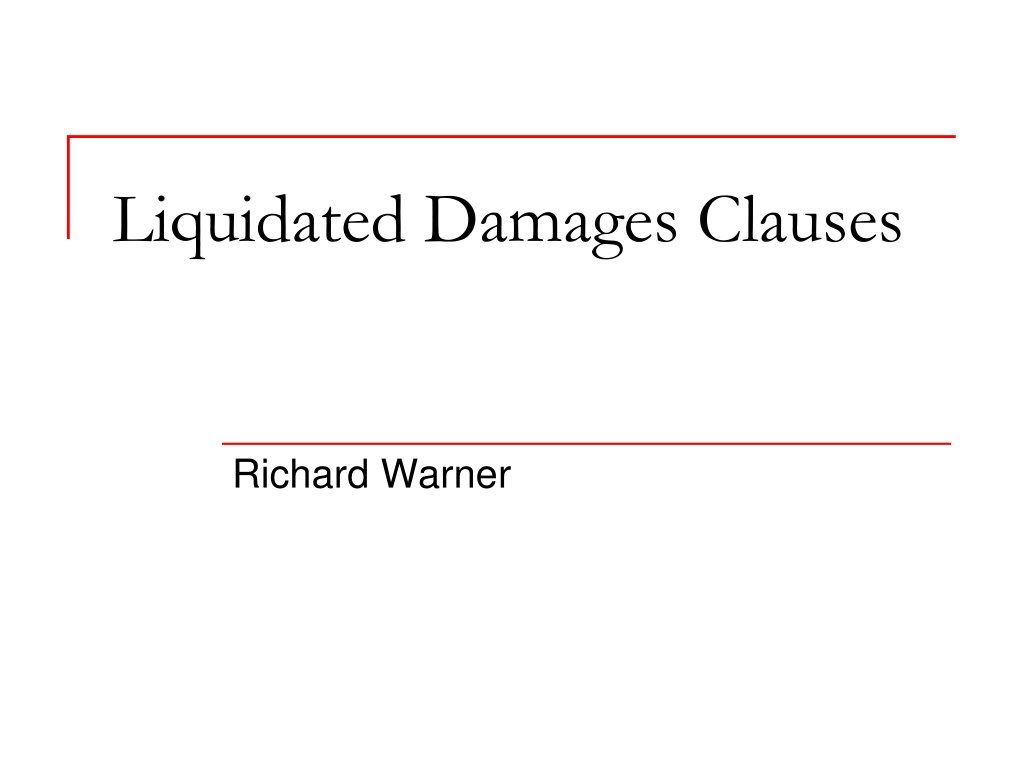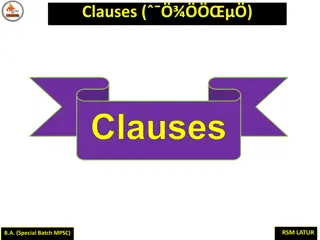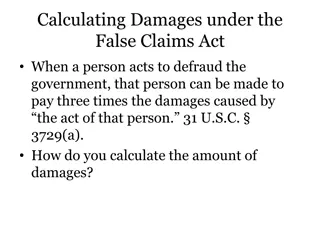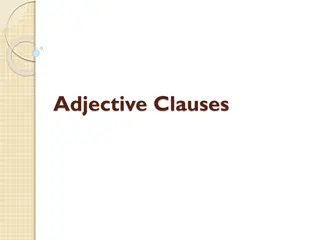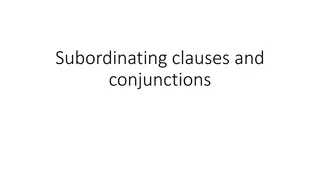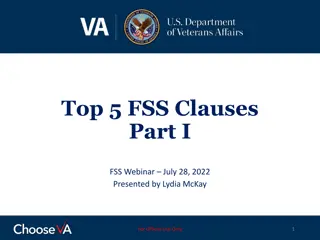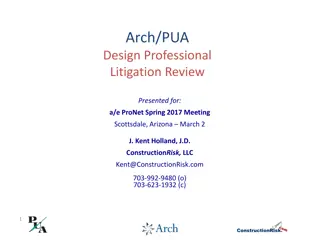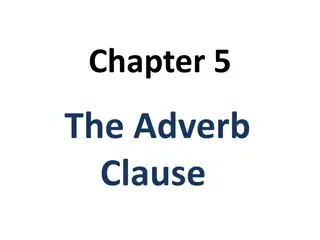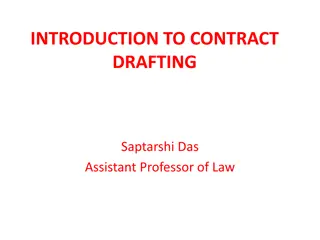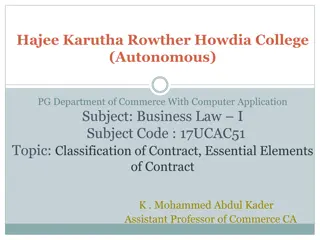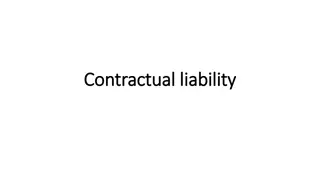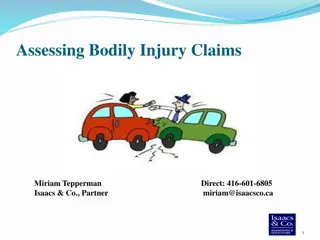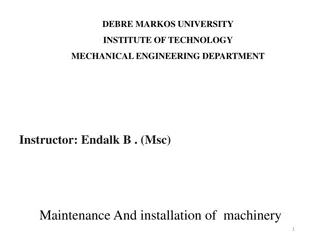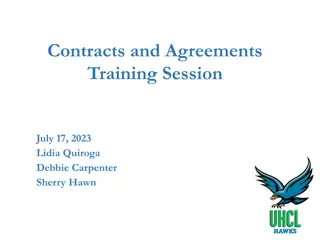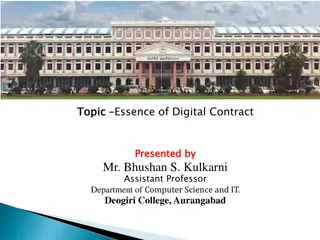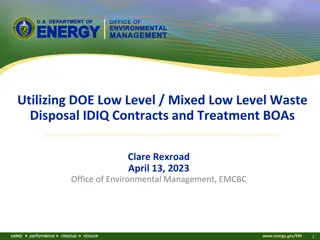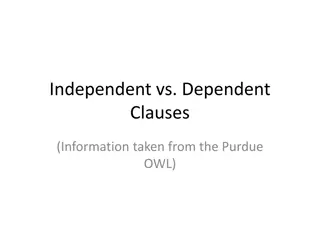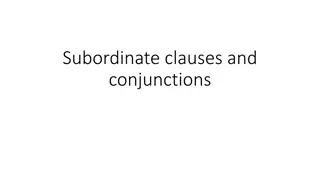Understanding Liquidated Damages Clauses in Contracts
Liquidated damages clauses serve to determine a precise amount of damages in case of contract breach when actual damages are difficult to ascertain. Courts enforce such clauses if they meet certain criteria based on reasonability and proportionality. Historical hostility towards these clauses has led to special rules for evaluation, but modern courts may not exhibit the same attitude. An example involving Truck Rent-A-Center illustrates the application of liquidated damages in a lease agreement.
Download Presentation

Please find below an Image/Link to download the presentation.
The content on the website is provided AS IS for your information and personal use only. It may not be sold, licensed, or shared on other websites without obtaining consent from the author. Download presentation by click this link. If you encounter any issues during the download, it is possible that the publisher has removed the file from their server.
E N D
Presentation Transcript
Liquidated Damages Clauses Richard Warner
Liquidated Damages Clauses A clause in a contract is a liquidated damage clause when liquidating damages is its essential purpose. Liquidate = determine the precise amount.
Black Letter Law A liquidated damages clause is enforceable when: actual expectation damages were not readily ascertainable at the time of contracting, and: Either: (1) The LDC is a reasonable estimate of damages, estimate made at the time of contracting; or: (2) The amount in the clause is reasonable proportionable to the actual damages as determined at the time of the trial. But not both. Cases split between (1) and (2). (1) is a more lenient-- more likely to enforce--attitude toward LDCs.
Hostility toward Liquidated Damages? You will read that courts have a hostile attitude toward liquidated damages clauses. Historically, that may be true. It would explain the existence of special rules to evaluate such clauses. See if you think modern courts are hostile toward liquidated damage clauses after we discuss Truck Rent-A-Center.
Truck Rent-A-Center Puritan Farms leased 25 new milk delivery trucks from Truck Rent-A-Center for use in th home delivery market. Milk trucks are highly specialized Milk storage Cooling systems Frequent stops
Estimating Expectation Damages Puritan farms could breach the lease by not renting the trucks full term. Problems estimating expectation damages at the time of contracting: Mitigation possibilities are uncertain: Re-rental market is uncertain Condition of the trucks is hard to predict Location of the trucks could be hard to determine So expectation damages are difficult to estimate.
Truck-Rent-A-Center Article 16 of the lease agreement provided that if the agreement should terminate prior to expiration of the term of the lease as a result of the lessee's breach, the lessor would be entitled to damages, "liquidated for all purposes", in the amount of all rents that would have come due from the date of termination to the date of normal expiration of the term less the "re-rental value" of the vehicles, which was set at 50% of the rentals that would have become due. In effect, the lessee would be obligated to pay the lessor, as a consequence of breach, one half of all rentals that would have become due had the agreement run its full course. The agreement recited that, in arriving at the settled amount of damage, "the parties hereto have considered, among other factors, Lessor's substantial initial investment in purchasing or reconditioning for Lessee's service the demised motor vehicles, the uncertainty of Lessor's ability to re-enter the said vehicles, the costs to Lessor during any period the vehicles may remain idle until re-rented, or if sold, the uncertainty of the sales price and its possible attendant loss. The parties have also considered, among other factors, in so liquidating the said damages, Lessor's saving in expenditures for gasoline, oil and other service items."
What Make It Reasonable? Looking forward from the date of the lease, the parties could reasonably conclude, as they did, that there might not be an actual market for the sale or re-rental of these specialized vehicles in the event of the lessee's breach. To be sure, plaintiff's lost profit could readily be measured by the amount of the weekly rental fee. However, it was permissible for the parties, in advance, to agree that the re-rental or sale value of the vehicles would be 50% of the weekly rental. Since there was uncertainty as to whether the trucks could be re-rented or sold, the parties could reasonably set, as they did, the value of such mitigation at 50% of the amount the lessee was obligated to pay for rental of the trucks. This would take into consideration the fact that, after being used by the lessee, the vehicles would no longer be "shiny, new trucks", but would be used, possibly battered, trucks, whose value would have declined appreciably. The parties also considered the fact that, although plaintiff, in the event of Puritan's breach, might be spared repair and maintenance costs necessitated by Puritan's use of the trucks, plaintiff would have to assume the cost of storing and maintaining trucks idled by Puritan's refusal to use them.
Deference to the Parties The court defers to the parties judgment. This makes good sense where; The parties are experienced businesses The contract shows that they considered relevant factors And they freely agree to the liquidated damage clause. Courts that defer to the parties judgment are not hostile toward liquidated damage clauses.
Lake River v. Carborundum Carborundum Co. (Carborundum) (defendant) produces Ferro Carbo, which is a powder used in steel manufacturing. Carborundum entered into a distribution contract with Lake River Corp. (Lake River) (plaintiff), under which Lake River would bag the Ferro Carbo in its warehouses and ship it to Carborundum s customers. Because Lake River had to purchase new equipment to fulfill the agreement, it insisted that Carborundum agree to ship a minimum quantity of Ferro Carbo within three years or pay the difference. Subsequently, demand for steel fell, and Carborundum did not meet the minimum shipments it had guaranteed.
Mitigation Possibilities Depending on the circumstances, Lake River might be able to mitigate its damages by bagging ferro carbo for other companies, or by converting its machinery to bag other products. (a) Yes (b) No
The Liquidated Damage Clause In consideration of the special equipment [i.e., the new bagging system] to be acquired and furnished by LAKE- RIVER for handling the product, CARBORUNDUM shall, during the initial three-year term of his Agreement, ship to LAKE-RIVER for bagging a minimum quantity of [22,500 tons]. If, at the end of the three-year term, this minimum quantity shall not have been shipped, LAKE- RIVER shall invoice CARBORUNDUM at the then prevailing rates for the difference between the quantity bagged and the minimum guaranteed. Does this take mitigation possibilities in to account? (a) Yes (b) No
Count On Us Computers You buy a computer from Count on Us Computers. Your contract includes the following liquidated damage clause: If after two attempts to repair any malfunction, Count on Us does not successfully do so, Count on Us shall pay the purchase price to the buyer who gets to keep the computer. Suppose that Count on Us twice fails to repair a minor problem in the display, a problem that is merely a minor nuisance. What are the damages? Is the clause enforceable? Should it be enforceable?
2-718. Liquidation or Limitation of Damages; Deposits. (1) Damages for breach by either party may be liquidated in the agreement but only at an amount which [1] is reasonable in the light of the anticipated or [2] actual harm caused by the breach, the difficulties of proof of loss, and the inconvenience or nonfeasibility of otherwise obtaining an adequate remedy. A term fixing unreasonably large liquidated damages is void as a penalty.
Passenger v. Airline This is a contract dispute between a passenger--named, Passenger- -and an airline--named, Airline. Passenger held a first class ticket on Airline. Passenger purchased his ticket under a special contract offered only to first class passengers. The contract included this clause: Liquidated Damage Clause: If there is a delay of over six hours, we will return the full fare plus 10% of the fare for each additional hour over six hours up to a limit of double the full fare. The flight was overbooked, and Passenger was not allowed to board the plane; this resulted in a delay of twenty-four hours--more than long enough to entitle Passenger to double the fare under the liquidated damage clause, and that is what Passenger sues for. The cost of the ticket is $4000; so Passenger demands $8000. The LCD clause is (a) enforceable (b) Is not enforceable
Reliable Construction Reliable Construction is building a $70 million energy plant. The plant is supposed to generate a minimum of 1,000,000 megawatt hours per year. The contract contains the following clause: If the plant fails to generate the minimum of 1,000,000 megawatt hours per year, Reliable Construction shall forfeit the contract price of $70 million, and will pay for all other damages that are the foreseeable result of the failure to meet the minimum condition. The court that heard this case held the clause was enforceable. The court must have assumed the plant was worthless if it did not meet the 1,000,000 megawatt requirement. (a) Yes (b) No
